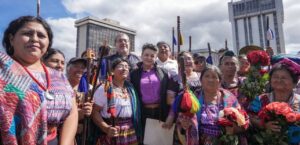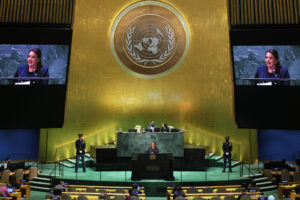Presidents, Top Government Officials of Mexico, El Salvador, Honduras, Guatemala to Meet with Vice President Pence this Week
Washington, DC—Today, Vice President Mike Pence is expected to meet with the presidents of Guatemala and Honduras, the vice president of El Salvador, and Mexico’s foreign minister and interior minister in order to discuss security and migration issues.
The meeting with Central America and Mexico’s leaders is taking place amid renewed discussion over what the U.S. government should do to address the root causes of migration. Over the past three years, Congress has approved a significant level of foreign assistance to Central America, in order to address the conditions driving people to leave their homes and migrate northwards. Despite this boost in funding, the ongoing arrival of thousands of Central American migrants—many of them families and unaccompanied minors—and the recently implemented zero tolerance policy that caused thousands of migrant families to be separated and detained this past summer has once again raised questions over how to best address the flow of people seeking protection at the U.S.-Mexico border.
Today, the Washington Office on Latin America (WOLA), a leading advocacy and research organization, is launching a database tracking U.S. assistance to Central America. This searchable database is designed to help journalists, policymakers, and citizens gain a clearer understanding about where U.S. aid to Central America is going and what kinds of programs it’s supporting. It aims to make it easier to monitor and understand how the United States is implementing the U.S. Strategy for Central America, a multi-year plan launched in 2015 to help address the root causes of migration. Users can search for U.S. programs by year, category, recipient country, and funding account.
The database pulls information from government reports, congressional notifications, budget justifications, and interviews to create a detailed, publicly available database of U.S. assistance to Central America since FY 2016. In particular, the database tracks efforts to reduce violence, strengthen law enforcement and the rule of law, combat corruption, increase accountability, and generate economic opportunities in El Salvador, Honduras, and Guatemala.
This database is part of the Central America Monitor, which tracks U.S. assistance to Central America and evaluates the progress that Central America is making in the fields of transparency, corruption, violence reduction, and justice and security reform through the use of a series of indicators.
Some of the larger trends revealed by the Central America Monitor’s assistance database include:
- In both Fiscal Year 2016 and 2017, the U.S. allocated around $432.2 million in bilateral assistance for Guatemala, $391 million for Honduras and approximately $302.2 for El Salvador.
- Overall, programs related to security, the judicial sector, and violence prevention received the greatest amount of funding in FY2016 and FY2017, with a total of about $500.3 million. In contrast, programs related to good governance, transparency, and human rights received just 15 percent (some $195 million) of the total amount of FY2016 and FY2017 funding.
- Programs supporting violence prevention, good governance, and other types of “soft” aid received a cut in funding between FY2016 and FY2017. However, funding for border and drug control programs increased by approximately $1.8 million in assistance, raising the question of whether doing so is the most effective approach to address the root causes of migration from Central America.
There has long been a lack of transparency and clarity about what types of programs the U.S government is funding to address the conditions driving migration from Central America. By making this data available and searchable, the effectiveness of these programs can be more easily assessed to ensure that U.S. funds are being wisely invested, properly implemented, and meeting their intended target.
Explore the Central America Monitor database here.


